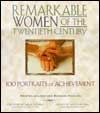|
 More
than any other time in history, the 20th century has witnessed the
emergence of women as a force for societal and cultural change. In
their book "Remarkable Women Of The Twentieth Century,"
authors Kristen Golden and Barbara Findlen chose 100 of the most
important women and have chronicled their many achievements and
contributions. In the introduction the authors write that "in
the major events of the twentieth century, as well as in everyday
life, the contributions of women are profound — and too often
unsung." The selection of these women is by the authors’
own admission neither exhaustive nor exclusive. It is, however, a
representation of the unprecedented contributions of women and
their influence on our world. More
than any other time in history, the 20th century has witnessed the
emergence of women as a force for societal and cultural change. In
their book "Remarkable Women Of The Twentieth Century,"
authors Kristen Golden and Barbara Findlen chose 100 of the most
important women and have chronicled their many achievements and
contributions. In the introduction the authors write that "in
the major events of the twentieth century, as well as in everyday
life, the contributions of women are profound — and too often
unsung." The selection of these women is by the authors’
own admission neither exhaustive nor exclusive. It is, however, a
representation of the unprecedented contributions of women and
their influence on our world.

The
book is divided into eight chapters; each chapter represents a
particular theme that reflects the remarkable lives the women
lived.
"Amazing
Grace" illustrates the qualities rarely found in a person:
dignity, style and creativity. Writer Helen Keller, artist Georgia
O’Keeffe and singer Joni Mitchell are cited as examples. Among
the most poignant is the biographical sketch on singer Marian
Anderson. In 1939 Anderson sang to the country on the steps of the
Lincoln Memorial after she was refused permission to perform in
Washington, D.C.’s Constitution Hall.
"Pioneering
Spirit" and "Courage of Her Convictions" define the
courage and vision that women have exhibited in the face of public
ridicule and scorn. Women such as Marie Curie and Margaret Mead
(scientists), Shirley Chisholm and Geraldine Ferraro
(politicians), and Rosa Parks and Fannie Lou Hamer (civil rights
activists) exemplify this spirit. One pioneer of local interest is
Illinois’ own Jane Addams. Although she is primarily known for
her founding of Hull House (one of the country’s first
settlement houses), Addams was also known for her work in women’s
suffrage and the American Civil Liberties Union, and she was the
first woman to win the Nobel Peace Prize.
"Bright
Ideas" and "One of a Kind" represent women who are
the "true originals" — whose style and personality led
to a single vision or concept that altered the course of history.
Women whose individuality served as a force for change include
computer scientist Grace Hopper, girls’ advocate Juliette Gordon
Low and television pioneer Joan Ganz Cooney. Among the most
interesting of these individuals is anesthesiologist Virginia
Apgar. Apgar, the first woman to head a department at the
prestigious Columbia-Presbyterian Medical Center, is best known
for developing the Apgar Score. This evaluation measures the
pulse, respiration, muscle tone, color and reflexes of newly born
babies. As a result of this test, newborns and their health are
instantly assessed to determine whether they need further medical
attention.
(To
top of second column in this book review)
|

"To
Tell the Truth" recognizes women whose beliefs were unwavered
in the face of skepticism or opposition. Environmentalist Rachel
Carson, poets Maya Angelou, Gabriela Mistral and Audre Lorde, and
journalist Helen Thomas — here are the stories of women whose
lives, according to the authors, "remind us that telling the
simple truth is a compelling act of courage." Documentary
photographer Dorothea Lange created some of the most emotionally
moving images of the Great Depression with her 1939 book, "An
American Exodus: A Record of Human Erosion." The authors write
of Lange, "Her legacy of pictures that speak volumes about the
human experience raised the consciousness of a nation."
The
concluding chapters, "Power Brokers" and "Lasting
Legacy," explore the themes of power, influence, drive and
determination in some of the most important figures of the century.
These spirited individuals include publisher Katharine Graham, talk
show host Oprah Winfrey and actress Mary Pickford. Pickford is
included as a power broker because of her self-transformation into
the most powerful woman in Hollywood (by forming United Artists
studios with fellow actors Charlie Chaplin and Douglas Fairbanks).
The
most eclectic group is the one that left a memorable and lasting
impression on the world. Dancer Martha Graham, educator Mary McLeod
Bethune and activist Gloria Steinem represent women who "have
an instinctive gift for touching people’s lives in ways that
transcend their times and circumstances." Perhaps the most
interesting biography in this section is on the working woman Rosie
the Riverter. Called "the icon of women" by the authors,
Rosie was a fictitious World War II female personality based on
"millions who became lumber and steel workers, electricians,
welders, mechanics, scientists, police officers, and bus drivers to
replace the millions of men who were mobilized for military
service."

"Remarkable
Women Of The Twentieth Century" is an outstanding compilation
extolling the achievements of some of history’s greatest women.
The writing is crisp and contains a personal element that draws the
reader closer to the compelling stories of these gifted and talented
personalities. The numerous photographs of the subjects profiled add
to the learning experience. Golden and Findlen have done an
admirable job of selecting an esteemed group and documenting their
lives and their impact. The inclusion of a selected bibliography and
index completes this enjoyable reading experience. This book is
highly recommended for readers both young and old.
For
more information, visit the library at 725 Pekin St. or call
217-732-8878.
[Richard
Sumrall, Lincoln Public Library District]
|

